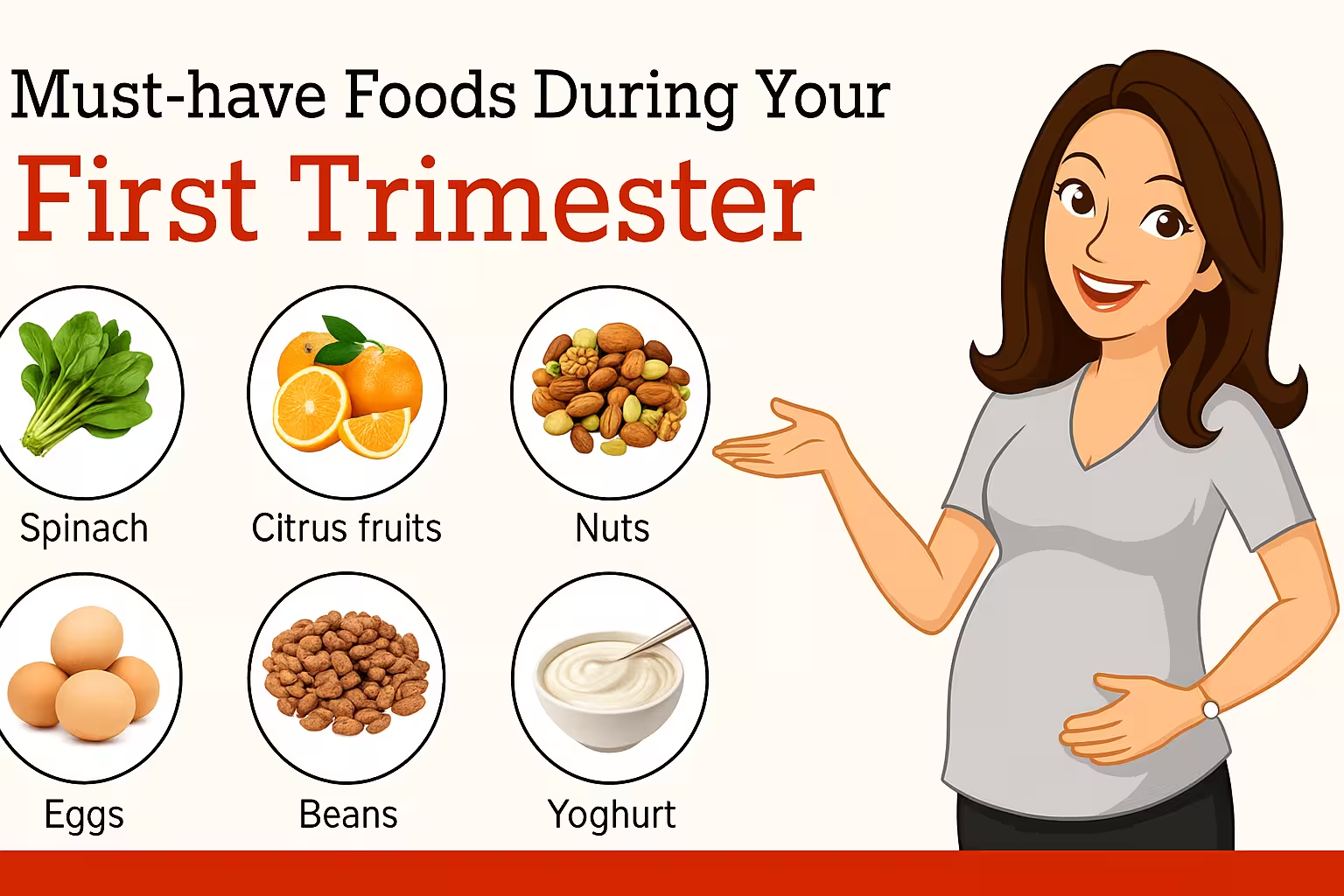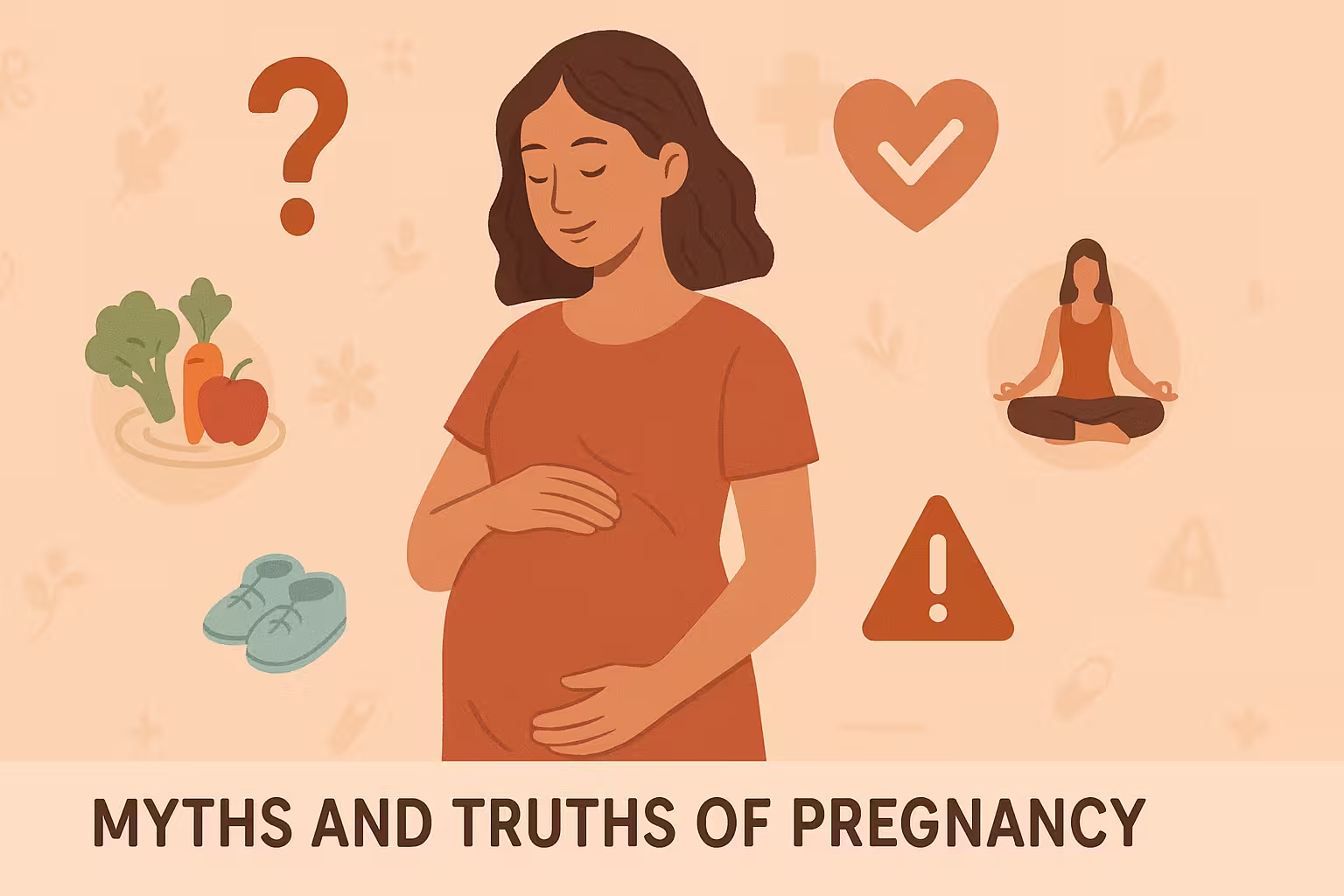Pregnancy is one of the most transformative stages in a woman’s life. The first trimester, which includes the initial 12 weeks, sets the foundation for both the mother and the developing baby. During this period, the body undergoes rapid changes to support fetal growth. Hence, understanding what to eat and what to avoid during early pregnancy is crucial for a healthy journey ahead.
This comprehensive guide focuses on pregnancy nutrition in the first trimester, highlighting the best foods to eat, essential nutrients required, foods to avoid, and practical healthy pregnancy tips. Whether you’re newly pregnant or planning a pregnancy, this resource aims to support you with trustworthy, medically sound advice.
Table of Contents
Why Nutrition Matters in the First Trimester
The first trimester is marked by critical developmental milestones. This is when the baby’s brain, spinal cord, and major organs begin to form. Adequate intake of nutrients not only supports fetal development but also helps the mother manage fatigue, nausea, and other early symptoms.
Key highlights of this phase:
- Neural tube forms (brain and spinal cord)
- Placenta begins to develop
- Rapid cell division occurs
- Increased demand for vitamins and minerals
A balanced diet ensures that the nutritional needs of both mother and baby are met.
Key Nutrients Required During the First Trimester
Let’s take a closer look at the essential nutrients that play a vital role during early pregnancy.
1. Folic Acid (Vitamin B9)
Folic acid is crucial for preventing neural tube defects. The recommended daily intake is at least 400-600 micrograms.
Sources: Fortified cereals, spinach, lentils, broccoli, oranges, avocado.
2. Iron
Iron supports the increase in maternal blood volume and aids in oxygen transport to the fetus. Iron deficiency can lead to fatigue and increase the risk of preterm delivery.
Sources: Lean red meat, spinach, legumes, iron-fortified cereals, pumpkin seeds.
Tip: Pair iron-rich foods with vitamin C (like lemon or oranges) for better absorption.
3. Calcium
Calcium supports the development of the baby’s bones, teeth, and muscles, while also preserving the mother’s bone health.
Sources: Dairy products, tofu, almonds, sardines, leafy greens.
4. Protein
Protein is essential for cell growth, tissue development, and repair. Aim for around 75-100 grams per day.
Sources: Eggs, fish, poultry, beans, lentils, dairy, quinoa.
5. Vitamin D
Vitamin D helps in calcium absorption and immune function.
Sources: Sunlight, fortified milk, fatty fish, mushrooms.
6. Vitamin B6
Helps in alleviating morning sickness and supports fetal brain development.
Sources: Bananas, chicken, potatoes, fortified cereals, chickpeas.
7. Omega-3 Fatty Acids
Important for fetal brain and eye development.
Sources: Flaxseeds, walnuts, chia seeds, and low-mercury fish like salmon.
Read Also: Essential Dental Tips for a Healthy Smile
Best Foods to Eat During Early Pregnancy
A well-planned diet during the first trimester can ease symptoms like nausea and vomiting while ensuring nutritional adequacy.
1. Whole Grains
Provide sustained energy and are rich in fiber, B-vitamins, and iron.
Examples: Brown rice, oats, whole wheat bread, quinoa.
2. Fresh Fruits and Vegetables
Rich in antioxidants, fiber, and vital vitamins like folate and vitamin C.
Examples: Berries, oranges, apples, carrots, sweet potatoes, spinach.
3. Dairy Products
Excellent source of calcium, protein, and vitamin D.
Examples: Milk, yogurt, paneer (cottage cheese).
4. Legumes
Packed with protein, fiber, folate, and iron.
Examples: Chickpeas, lentils, black beans.
5. Lean Proteins
Supports tissue development and fetal growth.
Examples: Eggs, poultry, fish (low mercury), tofu.
6. Nuts and Seeds
Provide healthy fats, protein, and essential minerals.
Examples: Almonds, walnuts, chia seeds, sunflower seeds.
7. Hydration
Staying well-hydrated is essential to support the increased blood volume and amniotic fluid.
Tip: Aim for at least 8-10 glasses of water daily.
Foods and Drinks to Avoid in the First Trimester
Certain foods may pose a risk of infections, toxins, or adverse effects on fetal development.
1. High-Mercury Fish
Can impair fetal brain development.
Avoid: Shark, swordfish, king mackerel, tilefish.
2. Unpasteurized Dairy and Juices
May contain harmful bacteria like Listeria or E. coli.
3. Undercooked or Raw Meat and Eggs
Risk of salmonella or toxoplasmosis.
4. Caffeine
Limit to under 200 mg/day (about one cup of coffee) to reduce miscarriage risk.
5. Alcohol
No safe level has been established. Avoid completely to prevent fetal alcohol spectrum disorders (FASDs).
6. Processed and Junk Foods
High in trans fats, sodium, and added sugars which can increase the risk of gestational diabetes and unhealthy weight gain.
Healthy Pregnancy Tips for the First Trimester
Here are a few practical tips to enhance your diet and wellbeing:
- Eat Small, Frequent Meals: Helps with nausea and maintains energy levels.
- Listen to Your Body: Cravings and aversions are common. Choose healthy substitutes.
- Include Prenatal Supplements: As prescribed by your doctor, especially for folic acid and iron.
- Avoid Crash Diets or Weight Loss Plans: Nutrient needs increase; pregnancy is not the time for dieting.
- Practice Food Safety: Wash produce, cook meat thoroughly, and check expiration dates.
- Consult a Dietitian: Personalized nutrition plans can be especially helpful in managing symptoms.
Sample One-Day Diet Plan for the First Trimester
Breakfast:
- Oatmeal with chopped banana and flaxseeds
- One boiled egg
- A glass of milk
Mid-Morning Snack:
- Handful of almonds and raisins
- Orange juice (fresh and pasteurized)
Lunch:
- Brown rice with mixed vegetable curry
- A cup of curd
- Lentil soup (dal)
Evening Snack:
- Whole wheat toast with avocado spread
- Herbal tea (ginger or peppermint)
Dinner:
- Grilled paneer or chicken with quinoa
- Steamed broccoli and carrots
- A small bowl of yogurt
Conclusion
The first trimester is a delicate and foundational phase of pregnancy. Choosing the right foods can support fetal development, reduce complications, and promote the mother’s overall well-being. A diet rich in folic acid, iron, calcium, and protein, combined with healthy lifestyle habits, can set the stage for a smooth and healthy pregnancy.
Every pregnancy is unique. Always consult your healthcare provider or a certified dietitian before making significant dietary changes. Remember, good nutrition is not just about what you eat, but how consistently and mindfully you nourish your body.
References
- Institute of Medicine (US) Committee on Nutritional Status During Pregnancy and Lactation. Nutrition During Pregnancy: Part I: Weight Gain; Part II: Nutrient Supplements. National Academies Press (US); 1990. https://www.ncbi.nlm.nih.gov/books/NBK235214/
- World Health Organization. Healthy Diet in Pregnancy. https://www.who.int/news-room/fact-sheets/detail/healthy-diet
- Centers for Disease Control and Prevention (CDC). Folic Acid. https://www.cdc.gov/ncbddd/folicacid/about.html
- American College of Obstetricians and Gynecologists. Nutrition During Pregnancy. https://www.acog.org/womens-health/faqs/nutrition-during-pregnancy
- Mayo Clinic. Pregnancy Diet: Focus on These Essential Nutrients. https://www.mayoclinic.org/healthy-lifestyle/pregnancy-week-by-week/in-depth/pregnancy-nutrition/art-20045082






